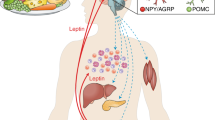Abstract
The fundamental biology of leptin and the leptin system is summarised. The hormone is produced in several organs, but primarily white adipose tissue, and is subject to acute regulation, particularly by the sympathetic nervous system. Leptin receptors are widely distributed, both centrally and peripherally, and there are several neuroendocrine targets. Although leptin is a key hormone in the regulation of energy balance, the biological effects of the hormone are extensive. Increasing leptin levels is unlikely to be an effective strategy for the treatment of obesity—except in those limited number of cases where there is a genuine deficiency of the hormone (eg in individuals with mutations of the leptin gene).
Similar content being viewed by others
Author information
Authors and Affiliations
Corresponding author
Rights and permissions
About this article
Cite this article
Trayhurn, P. Biology of leptin—its implications and consequences for the treatment of obesity. Int J Obes 25 (Suppl 1), S26–S28 (2001). https://doi.org/10.1038/sj.ijo.0801692
Issue Date:
DOI: https://doi.org/10.1038/sj.ijo.0801692
- Springer Nature Limited




